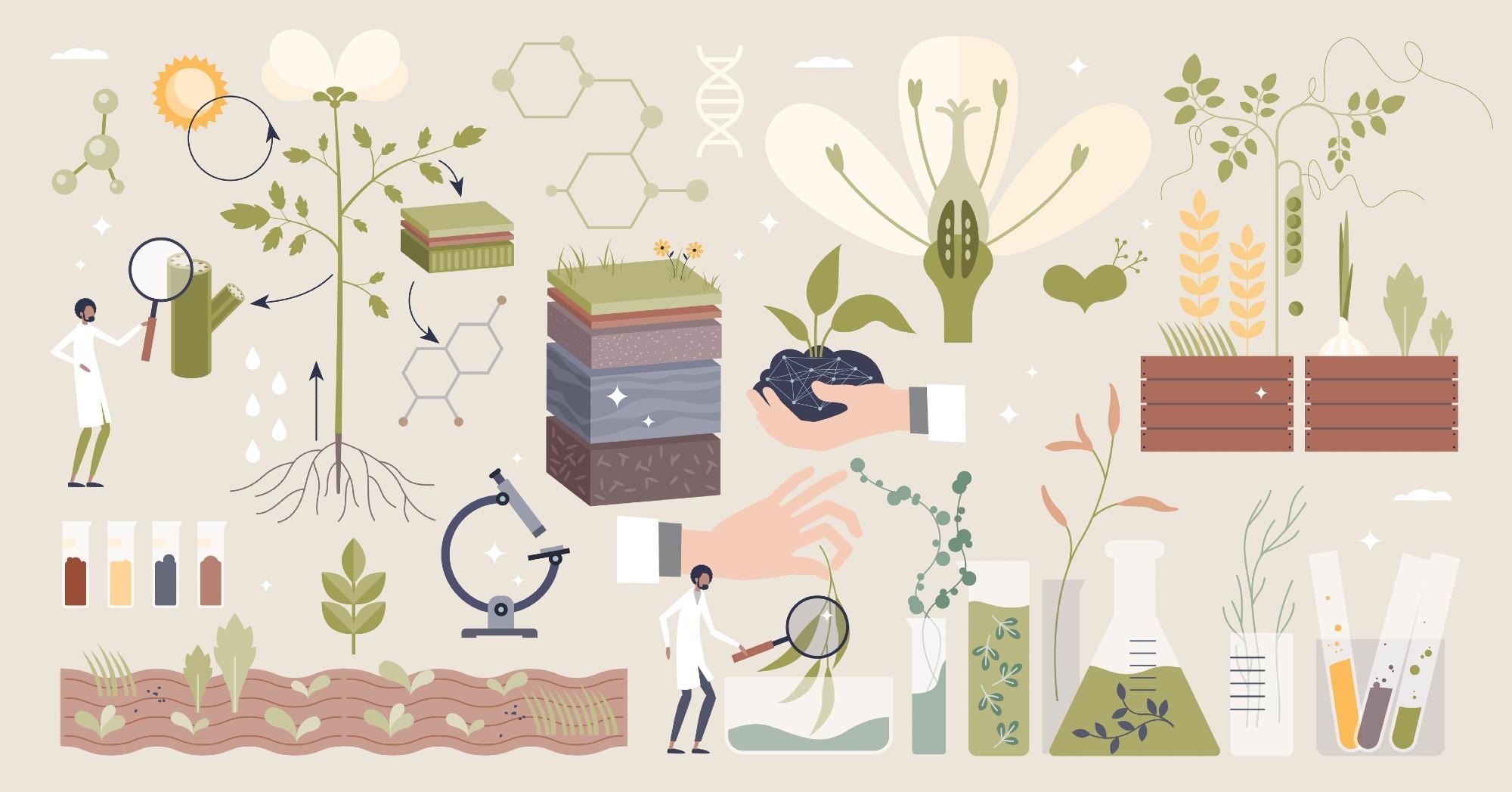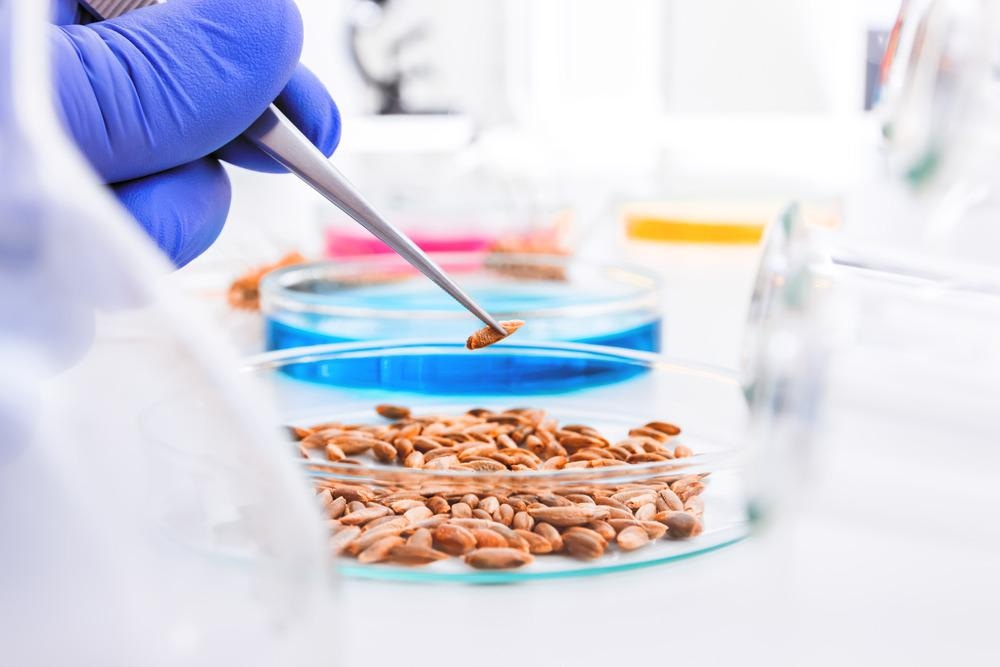The genetic modification of seeds has proven an effective method for improving valuable seed characteristics. In response to the increasing pressure on food security, the genes of economically valuable and environmentally resilient traits are being targeted with the aim of a higher yield.

Image Credit: VectorMine/Shutterstock.com
The co-occurring challenges of declining seed quality and rising food demand
Achieving food security with increasingly limited arable land and a rapidly changing environment is a global challenge due to a growing global population. Moreover another concern is the gradual decline in crop quality and nutrition due to the decrease in soil quality, higher usage of pesticides, and degradation of natural habitats. In turn, plant seeds have declined in quality, which is a fundamental concern to the future of food security.
Agricultural science has focused on breeding new varieties of crops with the traits of high yield, higher quality, and stress resistance to respond to rising food insecurity. This has been achieved by incorporating novel molecular techniques.
Over recent decades, ten kinds of plant transformation methods have been established. However, it remains challenging to quickly and easily create genetically modified crops. Nevertheless, agricultural genetic research has focused on critical aspects of crop production, including seed quality, which is the basis of agricultural production.
Genetic modification technology is an effective, economical, and sustainable practice to improve seed vigor, change the color or shape of seeds, or boost nutrient components and other agronomic traits for crops. Therefore, the application of genetic modifications can alter the face of agriculture by improving the quality and sustainability of production.
Genetic modifications as a promising candidate for stabilizing food security
To counteract the rising pressure on food demand, genetic modifications of plants and their seeds have become a key candidate solution to increasing yields and improving plant health. Genetically modified seeds can be defined as seeds that have been modified to contain specific characteristics such as resistance to herbicides (e.g., "Roundup Ready" products) or resistance to pests (e.g., Bt corn).
The method to attain genetic modifications of seeds varies from the traditional method of plant genetic modification as the genes have not been modified over generations of cross-fertilization as in plants but instead inserted directly into the DNA of the seed.
With the rise of increasingly refined molecular tools, numerous genes associated with seed characteristics have been identified in recent decades. Potential candidates boosting seed vigor, growth, or resistance, are hoped to be used to develop genetically edited crops for high and stable yield potential in crop production.
The benefits of using genetically modified seeds have been observed. Specifically, economic profits deriving from better yield and higher crop production allow farmers to expand production. Expected benefits also include the decreased use of chemical products such as herbicides.
Beyond stakeholders, genetically modified seeds also target consumer-valued traits such as decreasing allergens in key crops. This was the case in a study by Herman et al., 2003 who silenced a protein in soybean seeds responsible for allergen production.
The study found that silencing the essential target protein did not cause any compositional, developmental, structural, or ultrastructural phenotypic differences when compared with the control plant and provides a case study for eliminating one of the dominant allergens of soybean seeds.
Improving seed vigor and plant-based oils through genetic modification
Instances of genetic modification in seeds have been developed over the years, with key research on improving seed characteristics. Of particular importance has been the targeting of seed vigor, a trait often excluded from traditional breeding programs as it does not contribute directly toward high yield but a healthier plant instead.
Despite numerous genes associated with seed vigor being found to be usable for the creation of genetically edited crops for high and stable yield potential in crop production, their roles in improving seed vigor have yet to be validated by reverse genetics on large-scale samples before translation into application in agriculturally relevant crop species.
The success of targeting seed vigor was reviewed by Wu et al. in 2017, who emphasized that key targets such as the overexpression of protein L-isoaspartyl methyltransferase is efficient in boosting seed vigor. The authors discuss the value of improving vigor through the improvement of repair, detoxification, protection, and other mechanisms, before concluding on the implications associated with boosting seed vigor.
In another key example of seed modification, Karunanathra et al., 2020 identified vital genes associated with seed oil content, a valuable agricultural product. Authors used collections of rapeseeds and considered the decline in seed maturation, which is directly linked to seed oil quantity. The researchers found a collection of seed fatty acid reducer (SFAR) genes that affected oil content and fatty acid composition.
Using RNA-seq to quantify gene expression and q-PCR, the authors used CRISPR and random mutagenesis to induce a higher seed oil content without compromising seed germination, vigor, and oil mobilization. This is a critical instance in which a valuable characteristic is altered and offers a new perspective for improving oil yield.

Image Credit: Alex_Traksel/Shutterstock.com
The future of genetically modified seeds in an era of food insecurity
The genetic modification of seeds is predicted to accelerate into the future, with improved existing techniques and new techniques being developed.
Key innovations have already been undertaken, such as the use of nanoparticles to integrate exogenous DNA, as determined by Zhao et al., 2017. Most current genetic modification methods require regeneration from tissue culture, involving complicated, lengthy, and laborious processes. Authors in the study now report a new transformation platform technology, pollen magnetoreception, to produce transgenic seeds without regeneration directly.
This system uses exogenous DNA loaded with magnetic nanoparticles delivered into pollen in the presence of a magnetic field, generating transgenic plants from transformed seeds. This is a fast and straightforward system capable of multi-gene transformation.
Such techniques are vital to the progress of yield improvement to stabilize food security. Further application of genetic modifications to agriculturally important crops will play an increasingly important role in solving fundamental challenges facing agriculture, the depletion of natural resources, and the rapidly changing environment.

 Continue Reading: Insight into Genetically Modified Food
Continue Reading: Insight into Genetically Modified Food
Sources:
- Herman, E. M., Helm, R. M., Jung, R., & Kinney, A. J. (2003). Genetic Modification Removes an Immunodominant Allergen from Soybean,. Plant Physiology, 132(1), 36–43. https://doi.org/10.1104/pp.103.021865
- Karunarathna, N. L., Wang, H., Harloff, H., Jiang, L., & Jung, C. (2020). Elevating seed oil content in a polyploid crop by induced mutations in SEED FATTY ACID REDUCER genes. Plant Biotechnology Journal, 18(11), 2251–2266. https://doi.org/10.1111/pbi.13381
- Rustgi, S., Shewry, P., Brouns, F., Deleu, L. J., & Delcour, J. A. (2019). Wheat Seed Proteins: Factors Influencing Their Content, Composition, and Technological Properties, and Strategies to Reduce Adverse Reactions. Comprehensive Reviews in Food Science and Food Safety, 18(6), 1751–1769. https://doi.org/10.1111/1541-4337.12493
- Wu, X., Ning, F., Hu, X., & Wang, W. (2017). Genetic Modification for Improving Seed Vigor Is Transitioning from Model Plants to Crop Plants. Frontiers in Plant Science, 8. https://doi.org/10.3389/fpls.2017.00008
- Zhao, X., Meng, Z., Wang, Y., Chen, W., Sun, C., Cui, B., Cui, J., Yu, M., Zeng, Z., Guo, S., Luo, D., Cheng, J. Q., Zhang, R., & Cui, H. (2017). Pollen magnetofection for genetic modification with magnetic nanoparticles as gene carriers. Nature Plants, 3(12), 956–964. https://doi.org/10.1038/s41477-017-0063-z
Further Reading
Last Updated: May 16, 2022